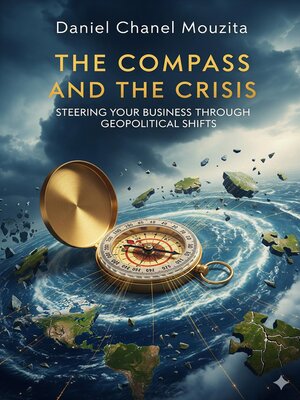The Compass and the Crisis
ebook ∣ Steering Your Business through Geopolitical Shifts
By Daniel Chanel Mouzita

Sign up to save your library
With an OverDrive account, you can save your favorite libraries for at-a-glance information about availability. Find out more about OverDrive accounts.
Find this title in Libby, the library reading app by OverDrive.



Search for a digital library with this title
Title found at these libraries:
| Library Name | Distance |
|---|---|
| Loading... |
Every leader has a playbook. It is a mental library of frameworks, strategies, and lessons learned from decades of navigating market cycles, technological disruptions, and competitor moves. This playbook, forged in the fires of the post-Cold War era, was built on a simple, foundational premise: that the world was moving inexorably toward a more integrated, open, and predictable global order. We believed in the free flow of goods, capital, and information. We optimized our supply chains for maximum efficiency, embraced a global talent pool, and pursued market access wherever it was available. The underlying geopolitical assumption was that stability was the default, and disruption was the exception.
That compass is now broken.
The world we operate in today is fundamentally different. The era of "hyper-globalization" is over, replaced by a new reality defined by fragmentation, competition, and uncertainty. The geopolitical landscape is no longer a distant concern to be handled by a specialized foreign relations team; it is an active, dynamic force that is already shaping your revenue streams, your supply chain, your capital allocation, and your talent strategy. The crisis is not coming; it has arrived.
The question is no longer if a geopolitical event will impact your business, but when, how, and with what velocity. The purpose of this book is to provide you with a new compass—a practical, actionable framework for not only navigating this new reality but for leveraging it to build a more resilient and future-proof enterprise.
We have entered an age where state-sponsored competition, economic nationalism, and the weaponization of trade and technology are no longer theoretical threats. They are the daily operating conditions. This is a new normal that demands a new mindset—one that sees geopolitical risk not as an external variable but as an embedded component of core business strategy.
This shift is more than just a trend; it is a profound structural change that has been gathering momentum for years. For evidence, look at the dramatic U-turn on globalization. In the decade leading up to 2010, the world saw a steady liberalization of trade policies. But a seismic shift occurred around that time.
The number of non-tariff barriers, from export controls to local content requirements, has multiplied, turning what was once a smooth global marketplace into a minefield of regulations.







